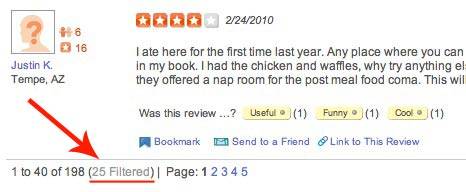Here at ReadWriteStart, we’ve mentioned the importance of credibility as an entrepreneur when meeting with venture capitalists and potential investors, but it is also important to carry that credibility forward into your company as you interface with customers. Amid rumors that it was extorting businesses by offering to de-emphasize negative reviews in return for adverting purchases, social review site Yelp announced Monday that it would be “lifting the veil” on its review system and removing controversial features in hopes of securing customer trust.

Yelp features a review filter that sorts through reviews of local businesses to determine which is more trustworthy and places the top ones on the business’ profile page. Some have claimed that Yelp was helping businesses pick the best reviews to show if that company was purchasing advertising on Yelp, a clear case of extortion that the company has vehemently denied, calling the claims a “conspiracy theory.”
Now when users visit a business’ Yelp profile, they can choose to look over the reviews the filter has automatically reviewed by clicking a link near the bottom of the page near the pagination links (not exactly the easiest feature to find, I had to search for “filter” to find it). Yelp has put a CAPTCHA pop-up between the profile and the filtered results to keep robots from crawling the filtered data. Perhaps this is an attempt to prevent them from figuring out how to game the system.

When I tested this new feature on one of my favorite downtown Phoenix restaurants, LoLo’s Chicken and Waffles, I saw some similarities among the 25 filtered reviews. A handful were from users who live in other states or who are what Yelp calls “less established users,” and some were either very short, or filled to the brim with Internet abbreviations and misspellings or slang. Others, whose content was hidden from view, had managed to violate Yelp’s review guidelines or terms of service, which I can assume means a variety of things including profanity or obvious spam.
Yelp is also discontinuing the use of the “Favorite Review” feature, which Yelp packed with advertising deals to businesses. Yelp CEO Jeremy Stoppelman says they decided to remove the feature in hopes of eliminating any confusion.
“Despite our best efforts to educate consumers and the small business community, myths about Yelp have persisted,” writes Stoppelman. “[The “Favorite Review” feature] led some people to the wrong conclusions about whether businesses could control the review content on their page. (They can’t.) So, to eliminate the opportunity for that misconception, we’ve eliminated the feature.”
By allowing users to go under the hood and see filtered results, Yelp is, I believe, taking a significant step in the name of transparency and openness. While they aren’t revealing any special algorithms for how they determine what makes trustworthy reviews, they are responding in a timely and appropriate manner to the continued allegations of foul play. Regardless of the merit of these claims, Yelp seems bent on securing the trust of their users, a practice every startup should mimic.
Also it is important to remember that a certain level of transparency is attractive to users, but not too much. There is a boundary between what should be shared with the community and what should be deeply guarded company secrets, such as fancy algorithms or the inner workings of the site’s major functions. Users can trust a company more when they feel they have some sort of insider’s view of the company through partial transparency.
Simply blogging about the company’s activity is sometimes enough to satisfy this need, but other times is may be appropriate, as Yelp has done, to incorporate features which help to underscore the product’s attempts at truth, honesty and validity, if those are major facets of your business.

















